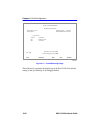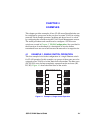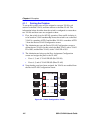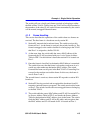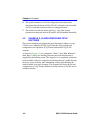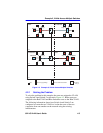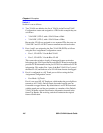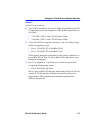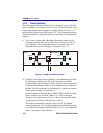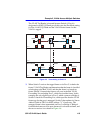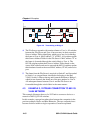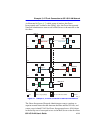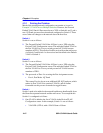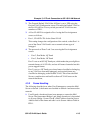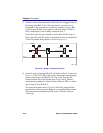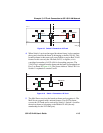
Chapter 4: Examples
4-8 802.1Q VLAN User’s Guide
4.2.2 Frame Handling
The following describes how, when User A attempts to log on to the File
Server on Bridge 4, the frames from User A are classified on Switch 4 and
traverse the network. In this example, the MAC address of User A is “Y”
and the MAC address for the File Server is “Z”. The following description
includes illustrations to help understand how the frames flow through the
network.
1. User A sends a frame with a Broadcast Destination Address in an
attempt to locate the File Server. The frame is received on User A’s
port of Bridge 1 and, because the frame is a broadcast frame, it is
transmitted out all ports of Bridge 1 as shown in Figure 4-4.
Figure 4-4 Bridge 1 Broadcasts Frames
2. Switch 4 receives the frame from Bridge 1 and immediately classifies
it as belonging to the Red VLAN. After the frame is classified,
Switch 4 checks the Destination Address and, upon discovering that it
is a Broadcast Destination Address, forwards the frame out all ports in
the Red VLAN Forwarding List excluding Port 1, which received the
frame. In this example, it is only Port 4.
Switch 4 updates its Source Address Table in FID 2 if it didn’t already
have a dynamic entry for MAC address “Y” in FID 2. Because
Switch 4 received the frame on Port 1, it does not forward the frame
out that port, but does forward the frame to Port 4.
The frame is transmitted to Switch 2 with a VLAN Tag Header
inserted in the frame. The VLAN Tag Header indicates that the frame
is classified as belonging to the Red VLAN. Figure 4-5 shows the path
taken to this point to reach Switch 2.
Floor 4
2263_14
1
3
2
Bridge 1
Bridge 2
Redco Blue Industries
Red VLAN
Red VLAN
Blue VLAN
Blue VLAN
User A
4
4



